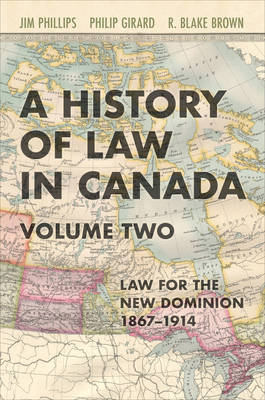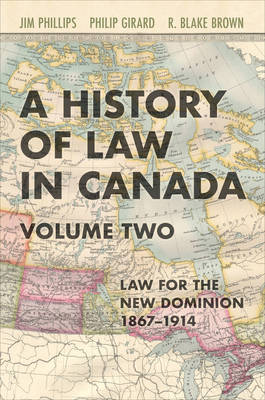
- Retrait gratuit dans votre magasin Club
- 7.000.000 titres dans notre catalogue
- Payer en toute sécurité
- Toujours un magasin près de chez vous
- Retrait gratuit dans votre magasin Club
- 7.000.0000 titres dans notre catalogue
- Payer en toute sécurité
- Toujours un magasin près de chez vous
A History of Law in Canada, Volume Two
Law for a New Dominion, 1867-1914
Jim Phillips, Philip Girard, R Blake BrownDescription
This is the second of three volumes in an important collection that recounts the sweeping history of law in Canada. The period covered in this volume witnessed both continuity and change in the relationships among law, society, Indigenous peoples, and white settlers. The authors explore how law was as important to the building of a new urban industrial nation as it had been to the establishment of colonies of agricultural settlement and resource exploitation. The book addresses the most important developments in the seventeenth, eighteenth, and nineteenth centuries, including legal pluralism and the co-existence of European and Indigenous law. It pays particular attention to the Métis and the Red River Resistance, the Indian Act, and the origins and expansion of residential schools in Canada.
The book is divided into four parts: the law and legal institutions; Indigenous peoples and Dominion law; capital, labour, and criminal justice; and those less favoured by the law. A History of Law in Canada examines law as a dynamic process, shaped by and affecting other histories over the long term.
Spécifications
Parties prenantes
- Auteur(s) :
- Editeur:
Contenu
- Nombre de pages :
- 800
- Langue:
- Anglais
- Collection :
Caractéristiques
- EAN:
- 9781487545673
- Date de parution :
- 14-11-22
- Format:
- Livre relié
- Format numérique:
- Genaaid
- Dimensions :
- 154 mm x 230 mm
- Poids :
- 1197 g

Les avis
Nous publions uniquement les avis qui respectent les conditions requises. Consultez nos conditions pour les avis.






